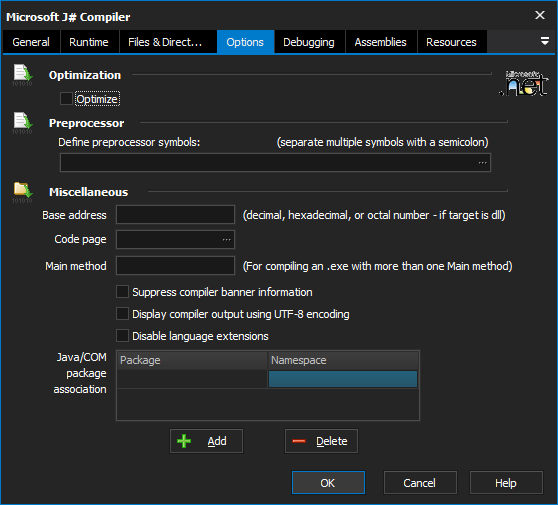Microsoft J# Compiler Action
This action executes the Microsoft .NET Framework J# command line compiler.

Files & Directories
Input Files
Project Directory
The directory of the J# project to be compiled.
Files to compile
The list J# files that are to be compiled. This option is able to take wildcards of * and ?. Typically the *.jsl value is specified to compile all J# source files.
Find source files in sub-directories
Sub-directories
Directories under, the main project directory, which source files are to be found.
Files
The list J# files that are to be compiled. This option is able to take wildcards of * and ?. Typically the *.jsl value is specified to compile all J# source files.
Output files
Output file
The resulting output file name that is required. Typically this will be the same name as the project with the file extension matching the type of output file.
Target type
Whether the output file will be an executable, library, module, or windows executable.
Framework Version
Use default framework version (vX.X) / Use vX.X
Allows the selection of the .NET version to use for the tool. The minimum is .NET v2.0.
Use 64-bit tools
This options specifies as whether to force the usage of 64-bit tools on a 64-bit system or not. As FinalBuilder is currently a 32-bit application it will default to running the 32-bit version on a 64-bit system. Check this option if you require the 64-bit version to be run.
Options
Optimization
Optimize
Enables compiler optimizations. This will signal to the compiler to make a smaller, faster, and more efficient executable. Note that combining this with debug information, however the application will be harder to debug.
Pre-processor
Define pre-processor symbols
Add the conditional defines that are required for the compilation
Miscellaneous
Base address
Used to specify the preferred base address at which to load a DLL.
Code page
Specifies which code page should be used if you compile one or more source code files that were not created to use the default code page on your computer.
Main method
Specifies which class contains the main method you want to use as the entry point into the program if your compilation includes more than one class with a main method.
Suppress compiler banner information
Turns off the inclusion of the compilers banner information in the log. This results in a slightly faster build, and smaller log file.
Display compiler output using UTF-8 encoding
Select this option to generate UTF-8 encoded compiler log output.
Disable Language Extensions
Disable all language extensions. This include Microsoft extensions in Visual J++, and .NET framework specific extensions.
Debugging
Debugging/Error checking options
Promote warnings to errors
Warnings are treated as errors and will stop the compile from proceeding. This will also cause the action to report as failed.
Debug information
The level of debug information to include.
Set warning level
The level of warnings to report during the compile.
0 - Turns off emission of all warning messages. 1- Displays severe warning messages. 2 - Displays level 1 warnings plus certain, less-severe warnings, such as warnings about hiding class members. This is the default warning level at the command line. 3 - Displays level 2 warnings plus certain, less-severe warnings, such as warnings about expressions that always evaluate to true or false. 4 - Displays all level 3 warnings plus informational warnings.
Suppress warnings
Specify the warnings that are to be suppressed during the compile. They are present in the format warning1, warning2 where each warning is listed by its warnings number.
Assemblies
Assemblies
Make package-scoped members internal to the assembly
Specify to restrict the scope of package level classes in the package.
Import metadata from a file that contains an assembly
Tells the compiler to import public type information from the supplied assembly. This allows referencing metadata from the imported types as though they were part of the assembly.
Location of assemblies referenced by means of /reference
The locations of the assemblies which are to be referenced.
Resources
Resources
Create link to a managed resources
Generates a link to a managed resource.
Embed .NET framework resources into the output file
The .NET resource for the project is embedded into the generated output file.
Insert Win32 resources into the output file
The Win32 resource for the project is embedded into the generated output file.